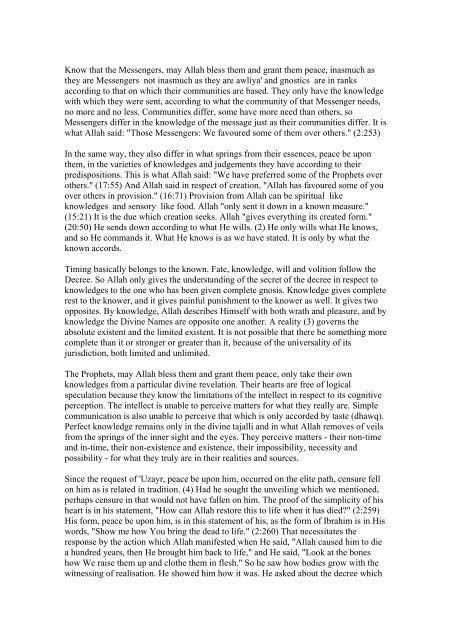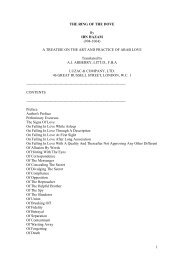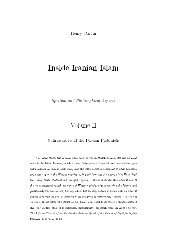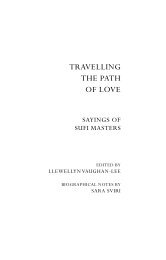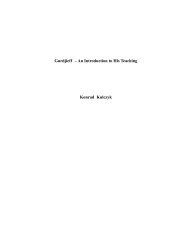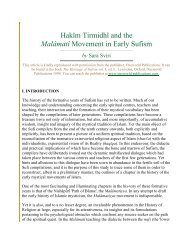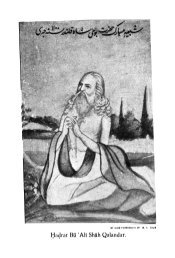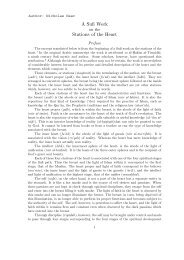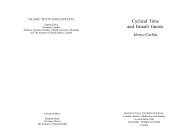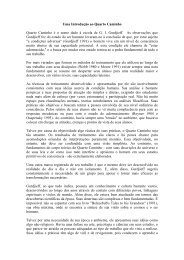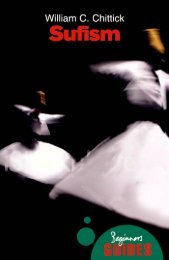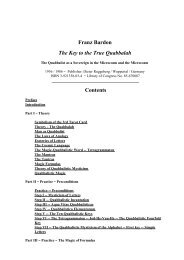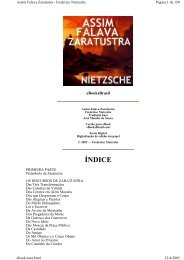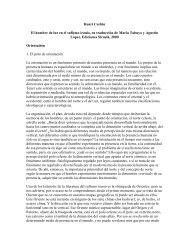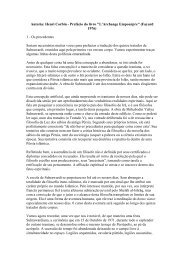Fusus al-Hikam The Seals of Wisdom by Shaykh al ... - ImagoMundi
Fusus al-Hikam The Seals of Wisdom by Shaykh al ... - ImagoMundi
Fusus al-Hikam The Seals of Wisdom by Shaykh al ... - ImagoMundi
You also want an ePaper? Increase the reach of your titles
YUMPU automatically turns print PDFs into web optimized ePapers that Google loves.
Know that the Messengers, may Allah bless them and grant them peace, inasmuch as<br />
they are Messengers not inasmuch as they are awliya' and gnostics are in ranks<br />
according to that on which their communities are based. <strong>The</strong>y only have the knowledge<br />
with which they were sent, according to what the community <strong>of</strong> that Messenger needs,<br />
no more and no less. Communities differ, some have more need than others, so<br />
Messengers differ in the knowledge <strong>of</strong> the message just as their communities differ. It is<br />
what Allah said: "Those Messengers: We favoured some <strong>of</strong> them over others." (2:253)<br />
In the same way, they <strong>al</strong>so differ in what springs from their essences, peace be upon<br />
them, in the varieties <strong>of</strong> knowledges and judgements they have according to their<br />
predispositions. This is what Allah said: "We have preferred some <strong>of</strong> the Prophets over<br />
others." (17:55) And Allah said in respect <strong>of</strong> creation, "Allah has favoured some <strong>of</strong> you<br />
over others in provision." (16:71) Provision from Allah can be spiritu<strong>al</strong> like<br />
knowledges and sensory like food. Allah "only sent it down in a known measure."<br />
(15:21) It is the due which creation seeks. Allah "gives everything its created form."<br />
(20:50) He sends down according to what He wills. (2) He only wills what He knows,<br />
and so He commands it. What He knows is as we have stated. It is only <strong>by</strong> what the<br />
known accords.<br />
Timing basic<strong>al</strong>ly belongs to the known. Fate, knowledge, will and volition follow the<br />
Decree. So Allah only gives the understanding <strong>of</strong> the secret <strong>of</strong> the decree in respect to<br />
knowledges to the one who has been given complete gnosis. Knowledge gives complete<br />
rest to the knower, and it gives painful punishment to the knower as well. It gives two<br />
opposites. By knowledge, Allah describes Himself with both wrath and pleasure, and <strong>by</strong><br />
knowledge the Divine Names are opposite one another. A re<strong>al</strong>ity (3) governs the<br />
absolute existent and the limited existent. It is not possible that there be something more<br />
complete than it or stronger or greater than it, because <strong>of</strong> the univers<strong>al</strong>ity <strong>of</strong> its<br />
jurisdiction, both limited and unlimited.<br />
<strong>The</strong> Prophets, may Allah bless them and grant them peace, only take their own<br />
knowledges from a particular divine revelation. <strong>The</strong>ir hearts are free <strong>of</strong> logic<strong>al</strong><br />
speculation because they know the limitations <strong>of</strong> the intellect in respect to its cognitive<br />
perception. <strong>The</strong> intellect is unable to perceive matters for what they re<strong>al</strong>ly are. Simple<br />
communication is <strong>al</strong>so unable to perceive that which is only accorded <strong>by</strong> taste (dhawq).<br />
Perfect knowledge remains only in the divine taj<strong>al</strong>li and in what Allah removes <strong>of</strong> veils<br />
from the springs <strong>of</strong> the inner sight and the eyes. <strong>The</strong>y perceive matters - their non-time<br />
and in-time, their non-existence and existence, their impossibility, necessity and<br />
possibility - for what they truly are in their re<strong>al</strong>ities and sources.<br />
Since the request <strong>of</strong> 'Uzayr, peace be upon him, occurred on the elite path, censure fell<br />
on him as is related in tradition. (4) Had he sought the unveiling which we mentioned,<br />
perhaps censure in that would not have f<strong>al</strong>len on him. <strong>The</strong> pro<strong>of</strong> <strong>of</strong> the simplicity <strong>of</strong> his<br />
heart is in his statement, "How can Allah restore this to life when it has died?" (2:259)<br />
His form, peace be upon him, is in this statement <strong>of</strong> his, as the form <strong>of</strong> Ibrahim is in His<br />
words, "Show me how You bring the dead to life." (2:260) That necessitates the<br />
response <strong>by</strong> the action which Allah manifested when He said, "Allah caused him to die<br />
a hundred years, then He brought him back to life," and He said, "Look at the bones<br />
how We raise them up and clothe them in flesh." So he saw how bodies grow with the<br />
witnessing <strong>of</strong> re<strong>al</strong>isation. He showed him how it was. He asked about the decree which


